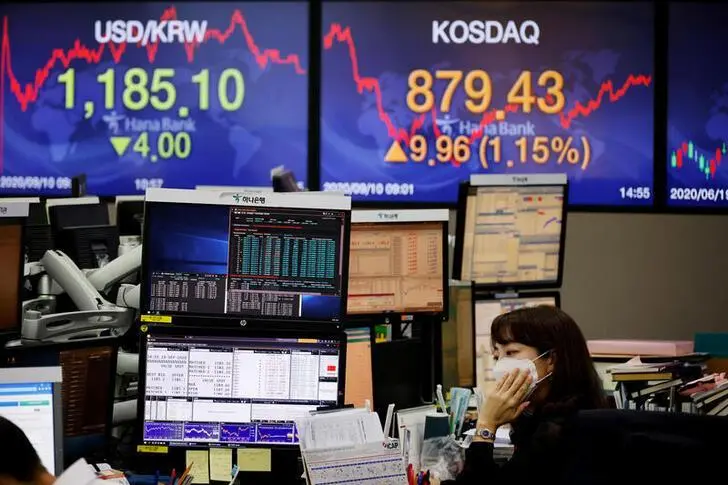PHOTO
South Korean shares closed lower on Friday, on heightened prospects of aggressive U.S. monetary tightening, but the won reversed early losses to end higher as authorities appeared to make an all-out effort to defend the psychological 1,400-mark.
The benchmark KOSPI index closed down 19.05 points, or 0.79%, at 2,382.78, extending losses to a third session and posting a fifth weekly loss of 0.06%. The won ended its onshore trade 0.41% higher at 1,388.0 per dollar, after opening the session at 1,399.0 to touch the weakest level since March 31, 2009.
The currency still ended the week down 0.52%, a sixth weekly loss in row. U.S. retail sales unexpectedly rebounded in August and weekly jobless claims fell, data showed overnight, providing support to views that the Federal Reserve would keep tightening its monetary policy aggressively. Amid the U.S. dollar's strength near its two-decade peak, neighbouring China's yuan breached below its own psychological threshold of seven per dollar for the first time in two years. Facing all the headwinds, the won opened the session lower, just an inch short of hitting the 1,400 level for the first time in 13-1/2 years.
But, it sharply recovered losses near the end of the session to turn stronger, with the country's foreign exchange authorities seen selling dollars heavily for a second day. "The authorities were seen to intervene really aggressively today," said a local FX dealer. The FX authorities had been suspected of selling dollars in the previous session as well, with the won recovering much losses to end only slightly weaker, after issuing an official verbal warning. Separately, the finance ministry plans to meet with major exporters and importers early next week to prepare market stabilising measures. So far this month, the won has weakened 3.6% against the dollar, at a faster pace than the Japanese yen and the Chinese yuan that are down 3.2% and 1.7%, respectively.
U.S. dollar index has added 1.1%. The won breached 1,300 mark in late-June, after falling below 1,200 in mid-October last year, which had been levels seen only during economic crises and thus considered to be psychologically "big figures". In the bond market, South Korea's treasury bond yields fell in late afternoon trade, with the yield of most liquid three-year bonds down 2.1 basis points to 3.754% and the benchmark 10-year yield down 3.4 basis points to 3.757%. (Reporting by Jihoon Lee and Yena Park; Editing by Sherry Jacob-Phillips and Uttaresh.V)





















